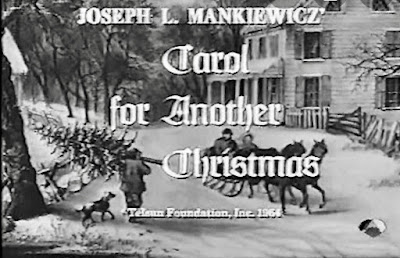Merry Christmas in July! It is Day #8 in the month-long celebration of Christmas entertainment. Each day this month I will be sharing brief reminisces about Christmas TV episodes, specials, and movies that are a creative or imaginative adaptation of Charles Dickens' tale A CHRISTMAS CAROL. Just a little something different and a way for me to show off the diversity of holiday stories I've collected in the encyclopedia Tis the Season TV (the updated and expanded 2nd edition will be released soon).
Today's discussion is on the 1964 feature-length drama Carol for Another Christmas, directed by Joseph L. Mankiewicz and written by Rod Serling. This version of Charles Dickens’ "A Christmas Carol" is not a faithful adaptation but rather, one with a particular political viewpoint--an anti-isolationist message against war, calling for diplomacy and compassion during the Cold War-era in which it was made. This movie was one among several TV specials the Xerox corporation produced in order to promote the United Nations. Carol for Another Christmas is not the typical feel-good Christmas movie that one would gather the family around the television to watch year after year. Instead, it is a celebrity-filled message movie with a very particular viewpoint.
 |
| Daniel Grudge and the Ghost of Christmas Past (Sterling Hayden and Steve Lawrence, respectively). |
In place of Ebenezer Scrooge, the story centers around the wealthy industrialist Daniel Grudge who is home alone on Christmas Eve, immersed in his sadness at holiday time. Daniel’s only son Marley was killed in battle during World War II. His nephew Fred visits Daniel to invite him to share Christmas with him but Grudge is not interested in sharing his Christmas in the company of others--especially someone whose politics he does not share. Grudge clearly outlines his personal values and political views of isolationism, espousing “minding one’s own business” and the backing of military escalation called “peace through strength.”
Later, that night Daniel is visited by the Ghost of Christmas Past, a World War I soldier minding a troop transport ship loaded with coffins of soldiers from history’s wars. The Ghost reminds Daniel that if we don’t embrace diplomacy and talking, we can not resolve conflict. Daniel is escorted to his own past, to a hospital in Hiroshima where he sees flashburned children, and where the Ghost explains that the weapons of today’s armies threaten humanity’s entire future. Next, Daniel meets the Ghost of Christmas Present, who is enjoying a sumptuous feast in front of a refugee camp filled with hungry, displaced persons. When questioned by Daniel, the Ghost explains that he reflects Daniel’s own beliefs in selective morality. He challenges Daniel’s ability to feel compassion for the hungry only when he can see them and to feel nothing for those he knows are hungry but he doesn’t have to look at. The Ghost reminds Daniel of the current troubling statistics of the world’s hungry, sick, displaced, and those suffering under tyranny.
In the most disturbing scenes, Daniel is escorted by the Ghost of Christmas Future to the crumbling town hall of Daniel’s hometown some time in the future. A devastating nuclear war has destroyed the world, but a few of the survivors gather in the building’s ruins. They are led by a man who calls himself the Imperial Me, who convinces the few surviving individuals to remain alone and unto themselves. He argues that coming together and working towards a common goal is what brought about the civilization that created the nuclear war in the first place--so to survive everyone must remain an individual and alone.
When Daniel awakens Christmas morning, he recognizes the error of his isolationist political philosophy. Newly transformed, he apologizes to his nephew Fred. As the two men listen to a radio broadcast of the children of UN delegates singing Christmas carols, Daniel, now embracing the dictum "no man is an island," remarks that diplomacy may not solve all the world’s nations' problems but it’s a hopeful start towards possibilities.
Although this film doesn’t attempt a faithful adaptation of Dickens’ classic work, it does contain quite a few essential elements and interesting details from the original story. At the film’s start, like Scrooge, Grudge embraces the lack of compassion for- and responsibility to- others including the underprivileged. Like Scrooge, during Daniel’s visits to Christmases past, present and future, the three ghosts remind him of his own cruel words spoken earlier to his nephew Fred--which he comes to regret. And just like in the original, the future is represented as a frightening possibility if Daniel doesn’t change his actions and beliefs in the present.
TV critics and academics have long trashed this production, however its ultimate destiny should lie in the hands of fans of its writer Rod Serling. Watching it feels like an extended Twilight Zone episode: A man finds himself subject to unexpected supernatural influences, forced to live out the logical conclusions of his political philosophy. At times, the movie feels much like a time capsule portraying the political environment of the mid-1960s and its Cold War ethics. However, many of the political views of the 1960s, though couched in different terms, still remain with us today, though perhaps not in such broad strokes.
Some viewers may be surprised by politics working their way into a Christmas story, however as a Christmas TV historian, I've seen numerous political Christmas stories and this isn't even the earliest example!
Carol for Another Christmas was not seen in decades but in the last ten years, it has been airing on Turner Classic Movies and now is often available through streaming platforms that license TCM (including Max).
The cast includes Sterling Hayden as Daniel Grudge, Ben Gazzara as the nephew Fred, Steve Lawrence as the Ghost of Christmas Past, Eva Marie Saint as Lt. Gibson, James Shigeta as the Hiroshima doctor, Pat Hingle as The Ghost of Christmas Present, Robert Shaw as the Ghost of Christmas Future, Peter Sellers as the Imperial Me, Percy Rodriguez as the butler Charles, Barbara Ann Teer as Ruby, and Britt Eckland as the knitting mother in the scenes of the future.
The movie’s theme music was written by Henry Mancini and was released on his 1966 album “A Merry Mancini Christmas.”
Joanna Wilson is a TV researcher and book author specializing
in Christmas entertainment. More about the TV programs mentioned on this website can
be found in her book "Tis the Season TV: the Encyclopedia of Christmas-themed Episodes, Specials, and Made-for-TV Movies." Her latest book "Triple Dog Dare:
Watching--& Surviving--the 24-Hour Marathon of A Christmas Story"
was released in 2016. She is currently updating and expanding the
encyclopedia for an upcoming release. Her books can be found at the publisher's website:
1701 press.com
*Support this website and its research by purchasing the books at 1701 press.com




No comments:
Post a Comment